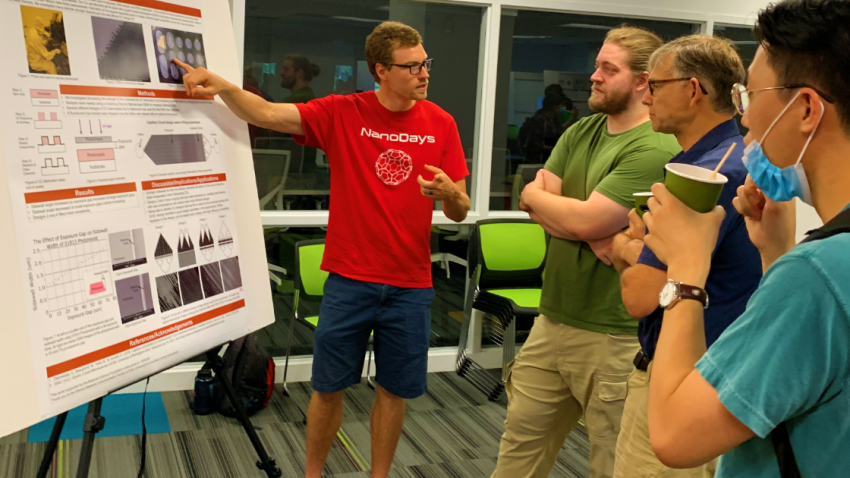You are here
Duke Engineering Lab Offers Public School Science Teachers Nanotechnology Experience
Stefan Zauscher’s lab provides hands-on summer research experiences for two public school science teachers, reaping benefits in the process

The best teachers always keep learning. They renew their passion, strengthen their knowledge base and polish their skills at every opportunity, then transfer it all back to the classroom.
Stefan Zauscher’s lab in the Thomas Lord Department of Mechanical Engineering & Materials Science (MEMS) at Duke gave two high school science teachers such an opportunity this summer.
 Through a National Science Foundation-supported Research Experience for Teachers (RET) program in partnership with the Research Triangle Nanotechnology Network (RTNN), they each spent five weeks developing microfluidic shear-wave sensor devices (i.e., quartz crystal resonators combined with tiny channels to control fluids for biosensing applications), including experiencing what it’s like to suit up and work in the cleanroom of Duke’s Shared Materials Instrumentation Facility (SMIF). Labs at North Carolina State University hosted an additional nine teachers for this year’s RET-RTNN program for a total of 11 across the two schools.
Through a National Science Foundation-supported Research Experience for Teachers (RET) program in partnership with the Research Triangle Nanotechnology Network (RTNN), they each spent five weeks developing microfluidic shear-wave sensor devices (i.e., quartz crystal resonators combined with tiny channels to control fluids for biosensing applications), including experiencing what it’s like to suit up and work in the cleanroom of Duke’s Shared Materials Instrumentation Facility (SMIF). Labs at North Carolina State University hosted an additional nine teachers for this year’s RET-RTNN program for a total of 11 across the two schools.
One of the two teachers in Zauscher’s lab worked on designing, fabricating and testing different microfluidic channel geometries for use in the sensor devices. In addition to receiving training in photolithographic processes, he also learned about fluorescence microscopy and image analysis. The other teacher focused on determining whether an immunoassay (biochemical test) could work with the sensor to measure the concentration of large molecules in blood plasma samples.
The microfluidic shear-wave sensor holds promise for use in clinical diagnostics and point-of-care medical settings.
“The greatest benefit is being able to share the experience of what it is like to do research with my students,” said Josh Hartzog, who teaches Advanced Placement Biology and Physical Science at East Chapel Hill High School. “When students are conducting their own experiments and their results aren't as expected or something doesn't work, I will be able to relate to them that this is the norm when doing research and that the process is iterative and takes time.”
Read more about the impact of this Research Experience for Teachers here >>
